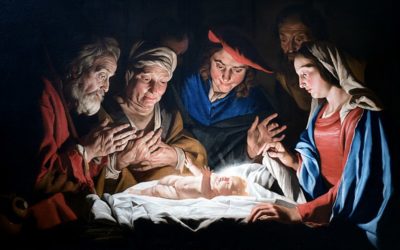No one’s perfect. “For all have sinned, and come short of the glory of God,” preached the apostle Paul (Romans 3:23). Alma the Younger taught his son Helaman that “the Lord cannot look upon sin with the least degree of allowance” (Alma 45:16). Taken together, these two principles can make us feel real inadequate at times.
Sometimes we might even wonder if we’ve totally blown it. Can the Lord trust us after we’ve made a bad mistake?
This week’s Come Follow Me readings, Doctrine and Covenants 3–5, answer that question with a resounding “Yes!” So long as we repent, the Lord will continue to work with us. Some immediate opportunities may be gone, but the Lord will provide other chances for us to assist in His great work.
Doctrine and Covenants 3
In section 3 of the Doctrine and Covenants, the Lord chastised Joseph Smith for a big mistake. In June 1828, Joseph was a poor, twenty-two-year old farm laborer, with the heavy assignment to translate the golden plates. At age forty-five, Martin Harris was twice Joseph’s age—a respected landholder who had given Joseph his time and money to assist with the project. Martin’s wife wondered why her husband was so devoted to the young man, and Martin leaned on Joseph for permission to show her the growing manuscript of the Book of Lehi from the first portion of the plates.
Martin wanted to please his spouse, and Joseph wanted to please Martin, who had made it possible for him to translate. They repeatedly pressed the Lord for permission, which was finally granted but under strict conditions. In Martin’s enthusiasm for the work, he went beyond the conditions, and the manuscript disappeared, to his and Joseph’s immense grief. In the midst of all this, Joseph’s wife, Emma, gave birth to their first child, who soon died. For further background on this revelation, see its historical introduction in the Joseph Smith Papers.
In section 3, the Lord rebukes Joseph (and through him, Martin), calling him to repentance but also offering that “God is merciful; therefore, repent of that which thou hast done which is contrary to the commandment which I gave you, and thou art still chosen, and art again called to the work” (verse 10). The Lord reproves with sharpness but also shows love (see Doctrine and Covenants 121:43).
The text of section 3 is the first recorded revelation of Joseph Smith, showing his new awareness about the importance of record-keeping. See the source note for this revelation in the Joseph Smith Papers.
Doctrine and Covenants 4
As Joseph and Emma suffered through these difficulties, they were living near Emma’s parents in Harmony, Pennsylvania. Joseph left Harmony at Emma’s urging to find out what had happened to the manuscript, and Joseph was staying at his parents’ home near Palmyra when Martin Harris visited and explained with great emotion that he had lost the precious document. When Joseph left to return to Emma, he was greatly distraught and worried about his standing before the Lord.
Understandably, Joseph’s parents worried about him when he left, and several months later, Joseph’s father decided to visit him in Pennsylvania, taking Joseph’s brother Samuel with him on the trip. Joseph had received the combined condemnation and comfort of section 3, and when his father, Joseph Smith Sr., visited him, the Lord also gave the older man a revelation through his son that has since become a favorite among missionaries and others who wonder how best to serve the Lord.
For further information on the background of this revelation, see its historical introduction in the Joseph Smith Papers.
Doctrine and Covenants 5
Martin Harris, of course, also worried about his standing before the Lord after he lost the manuscript. He had sacrificed time and money for the work of translation but still lacked the witness he had sought. Opposition to the work in the Palmyra area was building at the time, and Martin was feeling increased pressure from friends and family to turn against the Prophet. In March 1829, he visited Joseph, who received the revelation that is now section 5 of the Doctrine and Covenants. This revelation mentioned a future role for Martin, the one for which most Church members best remember him today, as one of the Three Witnesses to the Book of Mormon, if he lived worthy of the responsibility.
For more information on the history of this revelation, see its historical introduction in the Joseph Smith Papers.
Although the text (wording) of section 3 is the earliest surviving text of a Joseph Smith revelation, it survives only in a copy from 1831. The earliest document containing the text of section 5 dates to about April 1829, just weeks after the revelation was given. This makes it the earliest surviving copy of a Joseph Smith revelation. See the source note for this revelation in the Joseph Smith Papers.
(Photo credit for image at top of post: Martin Harris, public domain, copied from https://collections.lib.utah.edu/details?id=431516&q=%22Martin+Harris%22&facet_setname_s=dha_%2A [accessed Jan. 16, 2021]. For a recently colorized photo of Martin Harris, click here and scroll down.)



